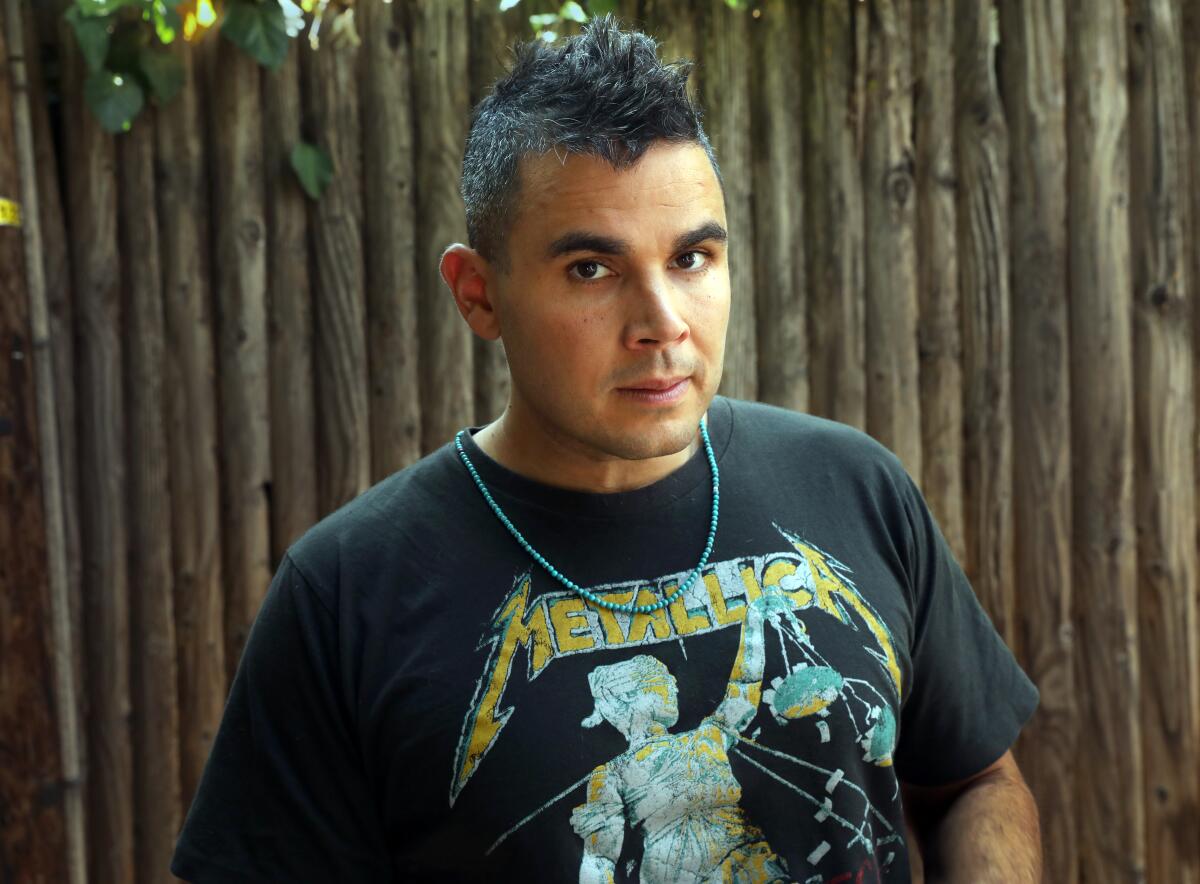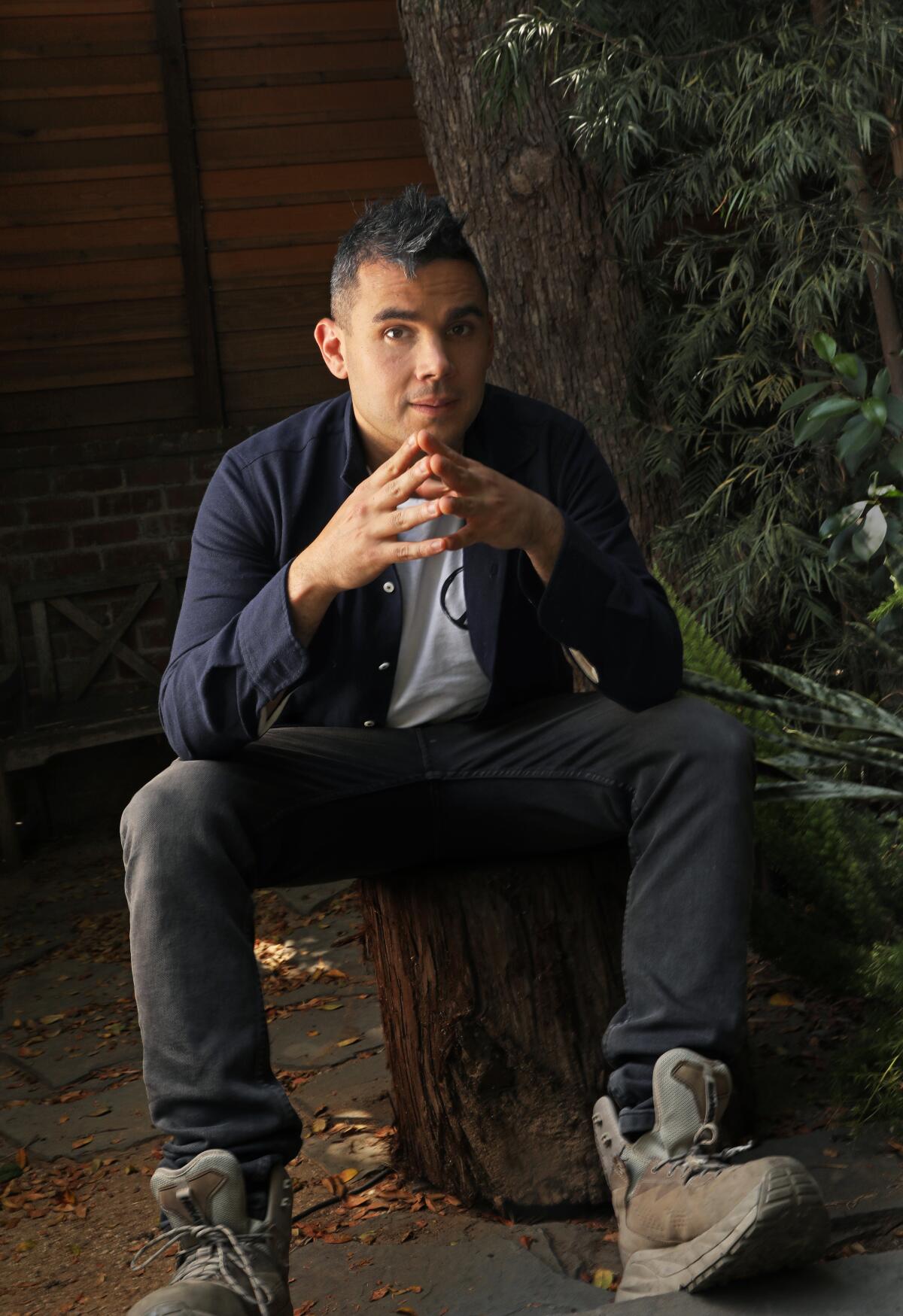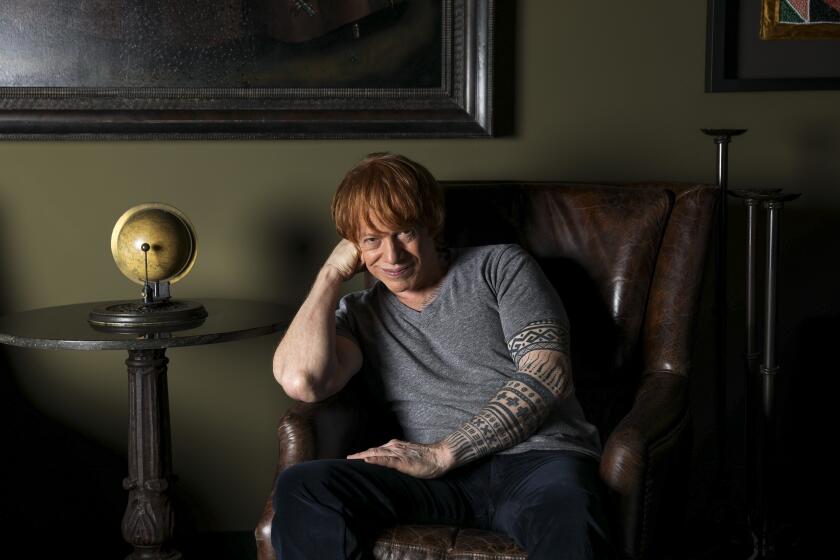Rostam: ‘I want to speak to Iranians in America, to nonwhite people, to queer people’

- Share via
When Rostam Batmanglij was a kid growing up in Washington, D.C. — “must have been 13 or 14,” he figures — he used to ride around in his older brother’s car listening to a collection of Bruce Springsteen’s greatest hits. So it was probably inevitable that the musician and producer (and former Vampire Weekend member) would end up decades later with a song like “4Runner” from his mesmerizing new album.
A sexy-dreamy bop about two lovers’ road trip up the West Coast, “4Runner” carries some big Boss energy — the propulsive tempo, the images of “stolen plates” and a “blanket on the backseat,” the very “I’m on Fire” falsetto at the end of the tune. Asked if he hears it too, Rostam smiles and reveals that it wasn’t just that formative experience at play: Throughout the process of making his “Changephobia” LP, he was listening intermittently to the audiobook of Springsteen’s memoir, “Born to Run.”
“It’s a fun thing to pick up and put down because you can take the time to listen to the records he’s talking about,” says Rostam, who’s 37 and works under his first name. “He talks about his first record not sounding good, production-wise, and about how insecure he was about his voice. When I went back and listened to that record, I was like, ‘Yeah, it doesn’t sound good.’” He laughs. “But his voice sounds fantastic. To him, it was his downfall; to me, it was the best thing about it.”

Rostam’s craftiness and his analytical thinking — not to mention his interest in music history — are all over the meticulously rendered “Changephobia,” which mingles fuzzy rock, aquatic R&B and 1940s- and ’50s-style jazz. The album, his second solo disc, arrives after a few years in which he primarily wrote and produced for other acts such as Clairo, Maggie Rogers and Haim, with whom he earned a Grammy nomination for album of the year with 2020’s “Women in Music Pt. III.”
Says Danielle Haim of that Los Angeles sibling trio: “My sisters and I, sometimes we get in our heads a little bit. But Rostam just knows how to pull you out: ‘Yes, go with that!’ It’s very freeing.”
She recalls the session in which they came up with “Gasoline” — a slinky psych-soul jam the band recently recut with Taylor Swift — as an exercise in speed. “He started playing this cool guitar line on his vintage Strat that I love, and suddenly we were going back and forth with lyrics,” she says. “It’s crazy how fast we’re able to put ideas together.”
Best known for his groundbreaking film scores for Tim Burton, Danny Elfman gets back to his art-punk roots on his first solo album in over 30 years.
For all the musicality it deploys, “Changephobia” feels like an emotional breakthrough for Rostam, who identifies as queer and whose parents fled from Iran during that country’s revolution. The intimately detailed songs ponder romance from a point of view not often heard in the largely straight white world of indie rock; Rostam, avoiding gendered pronouns in his lyrics, sings in a high, breathy voice that gently rejects old-fashioned binaries.
He’s never felt unwelcome in the indie world, he says, though the role he sees for himself makes clear the need for more representation: “I want my project to speak to Iranians in America, to nonwhite people in America, to queer people in America.”
“Changephobia’s” title hints at a kind of intellectual scaffolding — what Rostam describes in an explanatory YouTube video as an examination of “a fear of the unknown, of a future that is not yet familiar, one in which there is a change of traditions, definitions and distributions of power.”

Yet the album’s effect is deeply personal, as in the wistful “Next Thing,” about his move — his “escape,” as the lyric has it — from New York to California in 2014, and in the title track, a woozy internal monologue set to a swinging drum-and-saxophone groove: “Used to be afraid of what I felt / And what was coming up ahead / Then I learned I wasn’t so strange / Nothing I should hide from myself.”
“I want the songs to come from the central nervous system, not the brain,” he says at his studio in a hilly neighborhood on L.A.’s Eastside. “More instinctual.” The room is decorated with clean white furniture to match the clean white walls; there are keyboards, guitars and a set of weights that Rostam says he started lifting in the early days of the pandemic after he wondered what his life would be like if he were stronger. “I started with 25 pounds, but I keep having to escalate,” he says.
On a bookshelf near a window sits the Grammy he won for Vampire Weekend’s 2013 album “Modern Vampires of the City,” his last with the group before he announced on Twitter in 2016 that he’d quit because his “identity as a songwriter + producer … needs to stand on its own.”
Liz Phair’s new album, ‘Soberish,’ reunites her with the producer of ‘Exile on Guyville,’ her influential indie-rock masterpiece.
It’s easy to draw a distinction between Rostam’s approach on “Changephobia” and the chillier, more cerebral tone struck by Vampire Weekend’s mastermind, Ezra Koenig. (An important exception to Koenig’s control of the band’s storytelling, Rostam notes, was the 2010 song “Diplomat’s Son,” which Rostam explicitly fashioned as a “queer narrative.”)
Does he like Koenig’s lyrical style, which for all the band’s acclaim has long been criticized for valorizing a certain WASP-ish ideology? Rostam, who speaks like someone picturing his words in print, pauses as he considers the question. “I can’t really answer that because I feel like we were very entwined creatively for eight years,” he says. “I’m too close to it to have any perspective.”

The son of Najmieh Batmanglij, a well-known Persian chef and cookbook author, Rostam cofounded Vampire Weekend while he was still studying music at Columbia University. He’d already begun working outside the band by the time he officially left, but following his departure he collaborated widely with Frank Ocean, Solange and the frontman of another New York indie band, the Walkmen’s Hamilton Leithauser, with whom he made a handsome duo album in 2016.
He also wrote music for a Broadway production of Kenneth Lonergan’s play “This Is Our Youth” and for the Netflix sci-fi series “The OA,” which was created by Rostam’s brother, filmmaker Zal Batmanglij. Rostam’s solo debut, the intricately orchestrated “Half-Light,” came out in 2017.
For “Changephobia” he knew he wanted to take more care with his vocal performances than he had in the past — one result, perhaps, of having coached all those other singers in the studio — and to skip the string arrangements that defined “Half-Light”; in their place, he recruited saxophonist Henry Solomon (who also appeared on Haim’s album) to contribute ornate solos to seven of the LP’s 11 tracks.
“A lot of the time when I play with people, they say, ‘That’s too busy — don’t play all that stuff,’” Solomon says. “Rostam was like, ‘Actually, can you play more notes?’”
The sax player adds that Rostam talked excitedly about his love of bebop and invoked Charlie Parker as a touchstone, which says something about his eagerness to find a place at the center of mass culture in 2021. (Rostam himself admits he was “trying to sing a little like Chet Baker” in the album’s swooning closer, “Starlight.”)

Though some of his work has taken him to the margins of mainstream pop — last year Clairo’s “Sofia” hit No. 98 on Billboard’s Hot 100 after it went viral on TikTok — Rostam insists he’s not particularly attracted to the Top 40 factory that he likens to a “tantalizing cliffside for people who write songs and produce records and move to L.A.”
Which is somewhat difficult to understand at a moment when Jack Antonoff, who also used to play in a hip rock band and now counts Swift and Lorde among his clients, is making some of the biggest records in music.
“I feel like you revealed a lot with the word ‘biggest,’” Rostam replies. “That’s not what I’m interested in at all. What I’m interested in is something completely opposite to that, which is meaningful.”
Can’t a big pop album be meaningful too?
“But how do you know that your experience of the meaningfulness isn’t tainted by the bigness? In a capitalist society, we’re constantly tricked into thinking they’re the same thing. And they’re so far from it.”
Rostam gets the appeal of having the largest possible platform for his ideas; he took meetings with major labels about releasing “Changephobia” before deciding to put it out himself. But the bigger the platform, in his view, the more intense the pressure to compromise — which may also explain why he quit Vampire Weekend just as the band seemed to be approaching its commercial peak.

Asked if he thinks he’s ever really explained why he split — more clearly, that is, than in that gnomic tweet — Rostam laughs and says, “Why does anybody do anything?” Then he pauses for even longer than he did last time. “I’d rather just let my choices — the music that I’ve made and been a part of — speak for itself.” (Of his participation in Vampire Weekend’s 2019 “Father of the Bride” album, he says, “The extent to which I worked on it might’ve been overstated.”)
“Maybe my real answer,” he adds, “is that I like that you haven’t gotten a good answer.” As open as he is on “Changephobia,” Rostam closely guards the details of his private life; he doesn’t talk about a boyfriend or partner, for instance, and he asks that this story not reveal too much about where he lives.
“People have told me I’m paranoid,” he says. “But my parents survived a revolution that was so chaotic that their lives were at risk. And the truth is that you have to be paranoid in America to survive. The word ‘woke’ has come to mean so many things now — white people decided it was available to them, which I don’t necessarily agree with — but ‘woke’ is specifically about staying aware of the ways in which there is a system that is designed to oppress people of color.
“I come by my paranoia honestly.”
He knows some might read that and scoff, even without having seen the shiny Tesla parked outside his place. The thought brings a smile to his face.
“I was in Palm Springs on mushrooms with my friend Jeremy,” he says, referring to the writer Jeremy O. Harris, whose Tony-nominated “Slave Play” — about the intersection of race and sex in America — was the sensation of Broadway in 2019. “As a joke he thought it’d be funny to look up my net worth. The first one I saw made me laugh it was so far off.”
Too high or too low?
“I don’t want to say.”
More to Read
The biggest entertainment stories
Get our big stories about Hollywood, film, television, music, arts, culture and more right in your inbox as soon as they publish.
You may occasionally receive promotional content from the Los Angeles Times.












